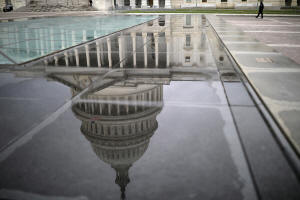Dueling paths for coronavirus relief, budget bills as U.S. Congress
enters key week
 Send a link to a friend
Send a link to a friend
 [December 15, 2020]
By Susan Cornwell [December 15, 2020]
By Susan Cornwell
WASHINGTON (Reuters) -Twin efforts were
underway in the U.S. Congress on Monday to reach a massive government
spending deal that would avert a government shutdown, as Republicans and
Democrats insisted they want to include a fresh round of aid to a
coronavirus-hit nation.
The leaders of both parties appeared more upbeat about doing the first
COVID-19 aid bill since April, while a bipartisan group of lawmakers
were pitching their own approach. The COVID-19 aid could be attached to
a critical spending measure that must be passed by Friday to avoid a
federal government shutdown.
House Speaker Nancy Pelosi and Treasury Secretary Steven Mnuchin
discussed both the government spending bill and a fresh round of
COVID-19 relief on Monday, a Pelosi spokesman said.

Pelosi reiterated Democratic concerns about the liability protections
against COVID-19 lawsuits that Republicans seek, and said remaining
unresolved items in the spending bill could be resolved easily, Pelosi
spokesman Drew Hammill wrote on Twitter.
Leading lawmakers were hammering out the government spending measure, a
$1.4 trillion bill for the fiscal year that began on Oct. 1. It would
include money for programs ranging from healthcare, homeland security
and military readiness to foreign aid, national parks and nutrition.
They have been operating on temporary funding.
Senator John Cornyn, a senior Republican, said what was needed was an
agreement on pandemic relief between Pelosi and Republican Senate
Majority Leader Mitch McConnell. He said he hoped for a result by
Wednesday.
"I think they have been talking and I'm confident their staff are
engaged," Cornyn told reporters. As for the bipartisan package, "I think
it's having a big, and a positive influence on what's, what will be
ultimately included," Cornyn said.
Senate Appropriations Committee Chairman Richard Shelby said the
government spending bill could be filed as soon as Tuesday, and he hoped
it would include COVID-19 relief. "That's what I've always proposed, I
hope so. We've got to have an agreement on the COVID stuff," he told
reporters.
Without a spending deal, the government would have to begin shutting
non-emergency programs and furloughing many workers in the midst of a
pandemic that has killed 300,000 Americans, thrown millions out of work,
and is getting worse as winter sets in.
McConnell said his party was ready to pass something on COVID-19 and
called on Democrats to do the same in a speech that avoided some of the
finger-pointing from both parties last week.
"The next several days are going to bring about one of two outcomes,"
McConnell said as he opened the Senate.
[to top of second column]
|

The U.S. Capitol Building is reflected on a marble seating area
following a rainstorm at the East Front on Capitol Hill in
Washington, U.S., December 4, 2020. REUTERS/Tom Brenner/File Photo

"Either 100 senators will be here shaking our heads, slinging blame
and offering excuses about why we still have not been able to make a
law. Or, we will break for the holidays having sent another huge
dose of relief out the door for the people who need it," he said.
McConnell said funding for personal protective equipment, vaccine
distribution and extended unemployment should be in any plan.
A bipartisan group of lawmakers from both the House and Senate
unveiled their own package, offering two proposals that could be
voted on separately.
One, a $748 billion proposal, includes aid to small businesses, the
unemployed and vaccine distribution. It would offer $300 weekly in
additional benefits to the unemployed, for 16 weeks.
The other bipartisan proposal includes the two main sticking points
on Capitol Hill: the liability protections for business and $160
billion for state and local governments, a Democratic priority. But
not even all of the bipartisan group of lawmakers support it.
"Bipartisanship and compromise is alive and well in Washington,
contrary to what you have been hearing," Senator Joe Manchin, a
Democrat and one of the lead sponsors, told a news conference. "Now
it's up to the leadership to take it and make it happen on a timely
basis."
Local public health agencies worry that they will not have enough
money to carry out a massive COVID-19 vaccination program if there
is no deal, even as the first U.S. doses of Pfizer Inc's vaccine
were administered on Monday.
President-elect Joe Biden has urged Congress to act quickly on
coronavirus aid before he takes office on Jan. 20. Even if it does,
his new administration likely will seek another round of aid next
year.
Democrats have been pushing hard for aid to state and local
governments to insure against laying off more workers, including
police, firefighters and emergency medical personnel. Republicans
have generally resisted this.

(Reporting by Susan Cornwell; Additional reporting by Richard Cowan,
Patricia Zengerle and David Shepardson in WashingtonEditing by Scott
Malone, Matthew Lewis, Jonathan Oatis and Sonya Hepinstall)
[© 2020 Thomson Reuters. All rights
reserved.] Copyright 2020 Reuters. All rights reserved. This material may not be published,
broadcast, rewritten or redistributed.
Thompson Reuters is solely responsible for this content. |